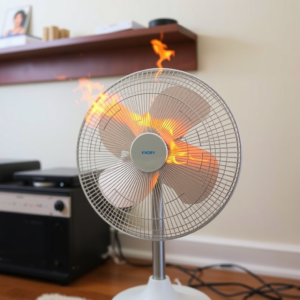Preventing Fan-Related Fire Hazards at Home
In the modern world, a fan has evolved from a simple device of cooling to an integral part of our homes, raising a common question: can fans catch on fire? These multifunctional appliances are very important for both temperature regulation and air circulation, making them even more stylish. Renowned brands like Dyson, Honeywell, and Lasko have made these innovative fans synonymous with their names, offering models that cool and clean the air for a healthier home environment.
With their wide usage and technical development, fans are not completely off the hook so far as safety is concerned. It goes to the important question which many homeowners and safety-conscious individuals ask themselves: can fans catch on fire? Though they are crucial for comfort and energy efficiency—by partnering with HVAC systems to reduce energy bills—fans can be hazardous should they not be taken care of properly or defects from manufacturing pass under the radar.
Just last year, instances where improper wiring or defective design could cause the fans to overheat and even catch fire forced the recall of certain models of fans. These highlight the importance of regular maintenance, being vigilant about product recall, and making informed choices while buying. Most of these risks can be reduced considerably by selecting fans from reputed brands that are known for their safety standards.
As we explore fan safety, this article provides essential tips and guidelines to prevent fire hazards in homes, ensuring efficient cooling solutions.
Common Causes of Fan-Related Fires
- Overheating Motors: Overheating caused by prolonged use is one of the foremost triggers of fan malfunctions. Overheating of
 motors can be brought about if the motors are clogged with dust. Additionally, if the fans have been allowed to operate continuously without breaks for cooling periods.
motors can be brought about if the motors are clogged with dust. Additionally, if the fans have been allowed to operate continuously without breaks for cooling periods. - Faulty Wiring: Poor electrical connections can cause short circuits, leading to sparks and potential fires.
- Manufacturing Defects: Occasionally, fans may be manufactured with specific structural imperfections that increase the risk of ignition, leading to potential recalls or replacements.
Signs to Watch for Potential Fan-Related Fires
- Burning Smell: An unusual odor could indicate overheating or electrical issues.
- Unusual Noises: Grinding or buzzing sounds might signal mechanical problems.
- Visible Sparks: Any sparking is a red flag and requires immediate attention.
Safety Tips for Using Fans at Home
- Regular Cleaning: The buildup of dust may block air passage and lead to excessive heat. Fanning blades, grills, and covers should be cleaned on a regular basis.
- Use Timers: Do not operate fans without supervision for a prolonged duration. Employ timers for automatic shutdowns.
- Check for Recalls: Stay updated on any product recalls related to your fan model.
- Professional Inspection: If you notice any of the warning signs, contact a professional electrician to inspect your fan.
When No Option is Left but to Sell a Fire-Damaged House
Most homeowners, after the fire has occurred, are in a dilemma trying to decide what to do with their fire-damaged property. One of the feasible alternatives is to sell the house to firms commonly referred to as “fire cash buyers.” These companies specialize in buying fire-affected properties. They serve as a blessing for homeowners who want to quickly sell their diminished assets. These cash buyers manage to provide speedy transactions, often within a few days rather than months that might be wasted with conventional sales.
The major advantage of selling to fire cash buyers is that you evade the huge cost of repairs, which might also be distressing to undertake. You can move on without the financial burden of restoring a fire-damaged house. These sales also eliminate the emotional stress involved with living in or trying to sell a fire damaged home.
There are some things to consider. Selling to a fire cash buyer often means accepting an offer below market value. This can potentially leading to a loss compared to selling after full restoration. Homeowners should also take precautions when finding buyers and ensure they’re working with honest, reputable companies. While the speed of the sale and stress relief are appealing, homeowners should carefully weigh the pros and cons. This will enable them to make a decision that aligns with their financial and personal circumstances.
Conclusion
Fans are indeed indispensable in comfort assurances and efficiency at home. Like other appliances, there are also risks pitted against them. Being aware of the reasons for fire outbreaks from fans is crucial for home safety. By taking safety measures, homeowners can enjoy the benefits of fans without compromising on safety. Have household fans checked and maintained regularly. If you have fire concerns about your property, have it professionally assessed or make timely evaluations.
Be alert but not passive; your safest home is your happiest home.
Previous